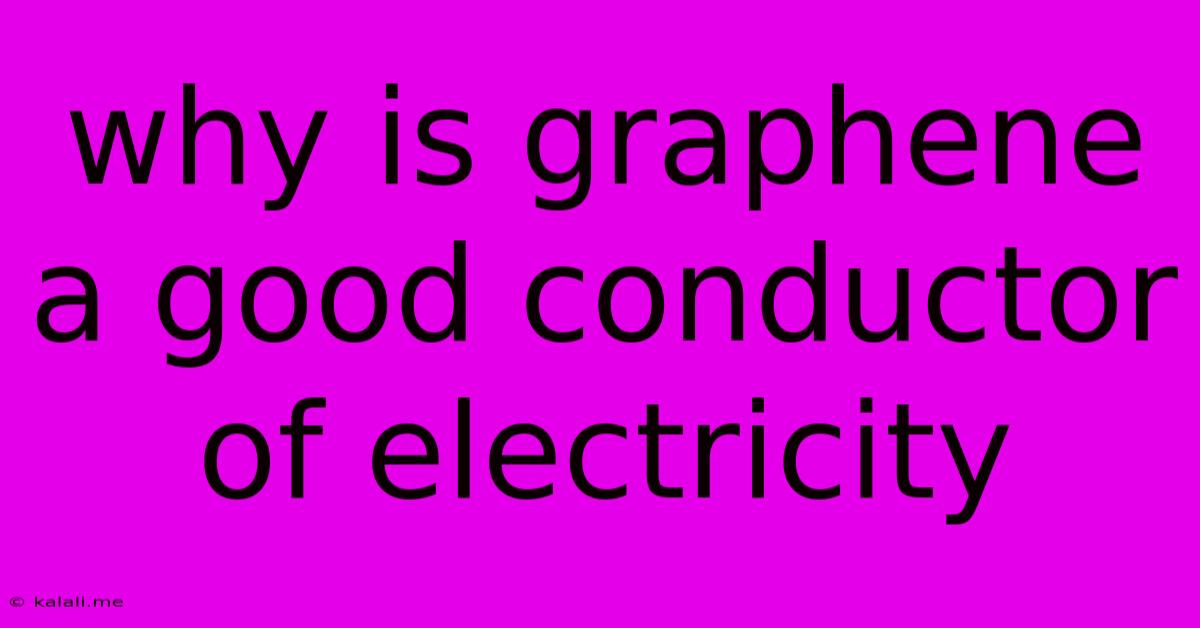Why Is Graphene A Good Conductor Of Electricity
Kalali
May 19, 2025 · 3 min read

Table of Contents
Why is Graphene a Superior Conductor of Electricity?
Graphene, a single layer of carbon atoms arranged in a hexagonal lattice, boasts exceptional electrical conductivity, making it a material of immense interest for technological advancements. This article delves into the reasons behind graphene's superior conductivity, exploring its unique atomic structure and electronic properties. Understanding these factors is crucial for appreciating its potential in various applications, from electronics to energy storage.
Graphene's remarkable electrical conductivity stems from its unique electronic structure. Unlike most other materials, graphene exhibits a linear dispersion relation near the Dirac points, leading to exceptionally high electron mobility. Let's break this down:
The Role of the Hexagonal Lattice and π Electrons
The foundation of graphene's conductivity lies in its hexagonal lattice structure. Each carbon atom within this lattice is bonded to three neighboring atoms via strong σ bonds, leaving one valence electron per atom unbonded. These unbonded electrons form delocalized π electron clouds above and below the plane of the lattice. These π electrons are responsible for graphene's exceptional conductivity.
High Electron Mobility: The Key to Superior Conductivity
Electron mobility refers to how easily electrons can move through a material when an electric field is applied. In graphene, the π electrons possess extremely high mobility, significantly exceeding that of silicon and other conventional semiconductors. This high mobility translates directly into superior electrical conductivity. Several factors contribute to this:
- Relativistic Behavior of Electrons: Near the Dirac points, the electrons in graphene behave as if they were massless relativistic particles. This unusual characteristic significantly reduces scattering, allowing electrons to travel long distances before colliding with imperfections in the lattice or other electrons. This results in minimal resistance to electrical current.
- Absence of Band Gap: Graphene lacks a band gap, a range of energy where no electron states exist. This means that even a small electric field can easily excite electrons into higher energy levels, allowing for facile current flow. This contrasts sharply with semiconductors, where a band gap must be overcome before significant current can flow.
- Unique Electronic Structure: The linear dispersion relation near the Dirac points allows for ballistic transport, meaning electrons can travel across relatively long distances without scattering. This dramatically enhances conductivity, resulting in extraordinarily high carrier velocities.
Comparing Graphene's Conductivity to Other Materials
To illustrate the significance of graphene's conductivity, consider its comparison to copper, a widely used conductor. While copper's conductivity is already excellent, graphene's surpasses it significantly, offering potentially much higher current carrying capacity. This makes graphene a promising candidate for applications requiring high-performance electrical conductors.
Conclusion: Graphene's Potential in the Future of Electronics
Graphene's exceptional electrical conductivity, stemming from its unique atomic structure and electronic properties, presents transformative possibilities for various technological domains. Its high electron mobility, absence of a band gap, and unique electronic structure position it as a leading material for future electronic devices, paving the way for faster, more energy-efficient, and advanced technologies. The ongoing research and development efforts promise to unlock even more of graphene's remarkable potential in the years to come.
Latest Posts
Latest Posts
-
How To Remove Rotten Fence Post From Concrete
May 20, 2025
-
Can You Make A Cheese Sauce With Self Raising Flour
May 20, 2025
-
On The List Or In The List
May 20, 2025
-
Words That Sound Like What They Mean
May 20, 2025
-
Sons Of Anarchy Who Is The Homeless Lady
May 20, 2025
Related Post
Thank you for visiting our website which covers about Why Is Graphene A Good Conductor Of Electricity . We hope the information provided has been useful to you. Feel free to contact us if you have any questions or need further assistance. See you next time and don't miss to bookmark.